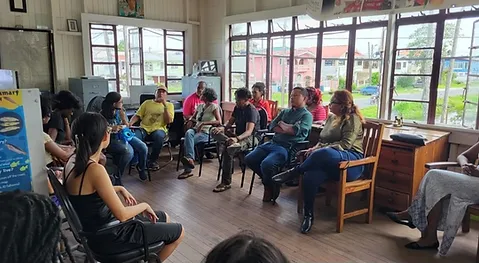Menu
Close

The Truth Be Told In-person Meet Up, Guyana. | Source: https://www.thebreadfruitcollectivegy.com/truthbetold
The Truth Be Told, a Caribbean Call to Action campaign successfully achieved its goal of raising awareness and advocating for gender-inclusive climate policies in the Caribbean region. Through collaborative efforts involving various stakeholders, the campaign engaged audiences, fostered community building, and catalysed changes in attitudes and commitments towards climate and gender justice. Leveraging social media platforms, the campaign reached over 132,000 individuals, facilitating conversations and knowledge-sharing on the intersection of climate and gender justice. Pre- and post-campaign surveys revealed increased awareness and understanding of climate change and gender justice issues among participants, demonstrating the campaign’s effectiveness in educating and empowering individuals. Additionally, the campaign’s policy advocacy efforts led to endorsements from 16 environmental and women’s rights organisations and attracted 144 new supporters. These outcomes underscore the importance of integrating gender considerations into climate policies and strategies. Moving forward, the campaign aims to continue outreach to policymakers and legislators and publish policy briefs to inform decision-making processes, advancing towards a more equitable, sustainable, and inclusive future in the Caribbean.
Inclusive policy recommendations were key milestones for the campaign, promoting an intersectional perspective, and addressing gender-based violence, harassment, educational disparities, and climate justice issues collectively. The campaign calls for financial support in the form of grants for grassroots organisations with an intersectional understanding of historical marginalisation. Additionally, it urges the full implementation and enforcement of existing policies and international agreements, emphasising grassroots input and alignment with global commitments. Transparency and accountability are highlighted, ensuring public access to information and governmental responsibility. Furthermore, the campaign underscores the importance of investing in youth-led initiatives, facilitating their meaningful participation in decision-making processes.
For centuries, Indigenous people have protected the forest and natural ecosystems, supporting climate mitigation and biodiversity conservation. Indigenous voices must be integrated into policymaking. Increased public education on the connection between climate and gender justice using various modalities, for example, the Caribbean Women for Climate Justice (CW4CJ) Conference and the Truth Be Told social media campaign. It is necessary to collect up-to-date, gender-disaggregated and relevant data to manage risks and develop effective policy instruments and appropriate risk mitigation strategies. Planning for disaster risk management must be informed by the perspectives of the full range of vulnerable communities, especially highlighting the risk to women, girls, LGBTQ+ persons, indigenous people, persons with disabilities, youths and the elderly. Caribbean countries must urgently ratify the Escazu Agreement and put measures in place to adhere to the treaty through local legislation that is transparent and includes accountability measures.
The Climate Justice Camp celebrated on March 31, 2024, brought together 120 youth climate and community leaders from across the Caribbean region to co-create and collaborate on demands for action, equity, and justice during the Caribbean Climate Justice Camp in Sint Maarten. During the event, participants focused on four key areas: the energy sector and transition, adaptation and resilience, gender and climate justice, and marine conservation. Solution-based frameworks were discussed, and cross-border networks were established to address the unique challenges faced by Small Island Developing States (SIDS).
The camp also served as a platform to prepare for the Fourth International Conference on Small Island Developing States (SIDS4), which will take place in May 2024 in St John’s, Antigua and Barbuda. Despite existing initiatives, regional challenges such as limited resources, distances, and funding have hindered collaboration. The camp was an initiative of young community leaders with the aim of overcoming these barriers and promoting regional alignment and collaboration.

Showcasing stories of Caribbean organizations at the foreground of the struggle against disaster capitalism in the Caribbean. Our network of participants in the Greater Caribbean region connect, learn, share their hands on responses to the impacts of the twin threats of the climate crisis and disaster capitalism in our region.
WAVE (Progressive Reform Movement)
Global Challenges Research Fund
Open Society Foundations
All Rights Reserved – strongercaribbeantogether.org 2022
All Rights Reserved – strongercaribbeantogether.org 2022
In the tumultuous aftermath of disasters, it is easy to feel isolated and alone, but you are not.
We, a network of Caribbean-wide community organizers who stand in solidarity with those affected the twin threats of the climate crises and disaster capitalism, a phenomenon that exacerbates the suffering of vulnerable communities.
We want you to know that your stories matter. We are here to listen, to support, and to amplify your voices.
We believe that together, we can challenge the forces of disaster capitalism and advocate for more sustainable, inclusive and equitable decision-making.
Join us in solidarity. Share your experiences and let’s build strong communities that thrive together.
As the wider world braces for the climate change, Caribbean communities are already struggling with its effects. Small local communities, small scale farmers and coastal communities are disproportionately affected. Political decisions, power dynamics and laws often compound the catastrophes and silence bottom up solutions.
There are ways in which you can help.